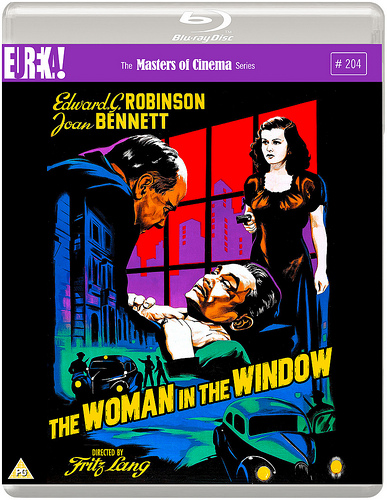With his wife and two kids away for a Summer vacation, Psychology Professor Dr. Wanley (Edward G. Robinson) is left all alone to enjoy his work. But his friends can’t help but poke fun at his lack of a sense of adventure. After leaving the gentleman’s club late one evening, He stops to look at an oil portrait of a mysterious woman. He shocked to find that real-life model named Alice (Joan Bennett), has secretly been watching him. The two grab a nightcap and move to her place. But once there, Alice’s lover comes home and attacks the professor. In a wild frenzy, he gets the upper hand and stabs the man to death.
After getting rid of the body, Wanley discovers that the man was a popular entrepreneur. And now there is a 10-Thousand-dollar reward for any information on the missing man. To add more to his troubles, the man’s bodyguard (Dan Duryea) is wanting money, or else he will turn the couple in.
WOMAN IN THE WINDOW (1944) was one of the first wave of films to be dubbed “Film Noir” by the French Film critics. And what a fine example of the genre it is. Fritz Lang (M, THE BIG HEAT) directs with his usual outstanding sense of creative flourishes. Lang takes the usual Hitchcock idea of an innocent man wrongly accused of a crime and flips it on its head. But WOMAN is more than just a simple crime thriller. It is a slick and clever tale of the dangers of growing tired of monogamy and seeking adventure.
Released within a year of Lang’s SCARLET STREET (1945, An English language remake of Jean Renoir’s LA CHIENNE), the two films share the three leads (Robinson, Bennett, and Duryea) and cinematographer Milton R. Krasner. Like the later film, WOMAN is a visual tour de force, with some of the most striking mood lighting in all of Lang’s career.
Film Noir being one of my favorite comfort food genres, WOMAN is filled with hallmarks of it. Venetian blinds, rain, endless cigarettes, witty bander, and of course the sleazy double entendres. Both Edward G. Robinson and Joan Bennett turn in excellent performances. Unlike SCARLET STREET, WOMAN is less pessimistic in tone. It still has Lang’s European Cynicism and harsh plot twists, but it has enough subtle comedy to lighten the tension.
Eureka! gives the film a handsome new transfer. The English 2.0 DTS-HD master audio track is spotless and sounds wonderful on my sound system. Bennett’s voice especially sounds clear as day. English subtitles are included.
The 1080p HD transfer has a few hiccups, the major one being a slight jitter on the bottom part of the screen. This appears randomly for a few sections of the film. It’s not a complete deal breaker, but it is distracting. The black levels are crisp and do justice to all the noir ambience. The focuses are likewise clear.
Eureka! Loads the disc with plenty of extras. First up is an audio commentary by film historian Imogen Sara Smith. It sounds like the same one included on The Kino Lorber Blu-ray here in The States. Miss Smith keeps the track fast-paced and packed with trivia about the movie. She makes a fine case for the film’s twist later third and discusses the film’s place in film noir history. The best new extra is a video essay on the film and Lang’s use of guilt by Critic David Cairns. Cairns talks about guilt in all of its forms in Lang’s career. My favorite element was the use of snaps that Lang would use to gain actors’ attention. As part of the collector’s edition there is a booklet of liner notes with a great essay by Film critic and historian Samm Deighan. Deighan’s attention to detail and love for Lang makes this an essential read! Overall Eureka! Gives WOMAN IN THE WINDOW the 4-star treatment!
Director- Fritz Lang
Cast- Edward G. Robinson, Joan Bennett.
Country of Origin- US
Format- Blu-ray
Discs- 1
Distributor- Eureka! Masters of Cinema Series.
Reviewer- Tyler Miller

